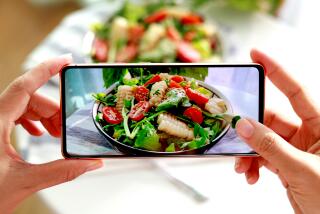Small steps to major rewards
Hers is the Cinderella story of the fitness world.
At age 40, Tosca Reno says she was nearly 80 pounds overweight, depressed and clinging to a bad marriage because, as a stay-at-home mother, she feared she couldn’t raise her three young girls on her own.
Today, at 53, she is one of the most recognized celebrities in the fitness world -- and not only because she recently posed for the cover of Oxygen magazine in a blue bikini that showed off trim, tight abs and a brilliant smile.
Reno says there’s nothing remarkable about her transformation, except that she consistently took the small, persistent steps toward health and wellness that she outlines in her latest book, “The Start Here Diet.”
“I didn’t come from a fitness world. I didn’t know where to begin,” Reno says. “But I knew I had to begin somewhere. I would get winded walking up a single flight of stairs. It scared me. I remember thinking, ‘If I don’t do something about this, I won’t see my girls grow up to be young ladies.’ ”
Reno says “The Start Here Diet” is her most revealing book to date, and there’s no doubt it’s her most accessible.
Typically, Reno is preaching to the converted. She writes a monthly column in Oxygen magazine, one of the few mainstream fitness magazines aimed at women who are not afraid to hit the weight room at the gym. She is also author of the “Eat Clean Diet” franchise, which includes more than a dozen bestselling wellness books and counts Angelina Jolie as a fan. (Reno is also behind the glute workout bible, “The Butt Book.”)
But she says she realized that the “Clean Diet” approach and its emphasis on exercising and eating like a body builder -- six small meals a day, eliminating all processed foods in favor of lean proteins, whole grains, and fruits and vegetables -- was too intimidating for some.
“Women would come up to me at a book signing and say, ‘I love your book, but I don’t know how to get started,’ ” Reno said. “So I thought, ‘Ah, I really need to go back to the beginning.’ ”
“The Start Here Diet” begins with Reno detailing the shambles of her life when she made the decision to put down the peanut butter, cheese and ice cream -- her “drugs” of choice -- and leave her husband. (She would go on to meet and marry the late fitness magazine publisher Robert Kennedy, who brought Reno into the pages of Oxygen and often pointed to his wife as proof that it’s never too late to get in shape.)
Reno’s book outlines the three-step process she says she took after her life reached a turning point.
In Step 1, she walks readers through what she calls an emotional “dive inward,” traversing thorny terrain such as the real reasons we turn to food for emotional comfort and how to break those destructive habits. Step 2 urges readers to identify just two or three “hidden foods” -- trigger foods that we binge on in secret.
“In my experience, it’s not a dozen foods that keep us from losing weight, but one, two or three old standbys,” Reno says. She goes on to coach readers to give up those foods for just one week, one of those baby steps that Reno says give people confidence that they can tackle their food demons.
“It’s really about changing your thinking and rewiring your brain,” Reno says. “When I realized it was just one or two foods standing in my way, it helped give me the momentum I needed to keep going. It was very exciting to see how changes could be made so dramatically. I remember trying on a skirt and it actually fell down and off of my hips, and I thought, ‘This is because I put the lid on the peanut butter!’ ”
While the book goes on to encourage a meal plan, there is no calorie counting or dictated menus. Reno explores ways to eat seasonally and make fast, easy meals. Recipes, for example, include an egg-and-muffin breakfast sandwich, peanut noodles with chicken and vegetables, and shrimp and sausage gumbo.
Don’t like to cook? Reno has suggestions for dining out, even at fast-food restaurants. There are dessert recipes, such as a homemade cherry pie, with the caveat that these dishes should be reserved for the rare splurge.
Step 3, of course, is fitness.
But it doesn’t necessarily mean the gym. Gardening and house-cleaning can be great workouts, she says.
Once people see progress on the scale and in the mirrors, it begins to snowball. People will begin to reach for more healthful foods and have the courage to embrace more intense levels of activity.
“The idea is to start small,” Reno says. “I want people to understand the difference between ‘food’ and ‘nutrition.’ It’s almost impossible to overeat kale. But it’s amazing how easy it is to overeat potato chips because there’s nothing satisfying in there. The body is beautifully programmed to keep asking for what it needs, and if you haven’t satisfied that need yet, your body will keep asking for it.”
There is so much about life that is beyond our control, Reno says. Three years ago, Reno’s stepson, Braden, died of injuries suffered during an accident years earlier. And while she was writing this book, Reno’s husband, Kennedy, succumbed to cancer.
But eating clean and exercising were areas over which she had “absolute control,” she says.
“I needed to fortify myself through these tragedies,” she says. “I didn’t make the same mistake of going back to my drugs of choice. And, really, that wasn’t going to help anything. I got through those days by sticking to the discipline of eating clean and exercising.”
That might sound daunting, as if requiring superhuman willpower and strength. So just start small, Reno says. “If you get rid of those ‘hidden foods’ and just move a little more each day, you will get amazing results.”
--



